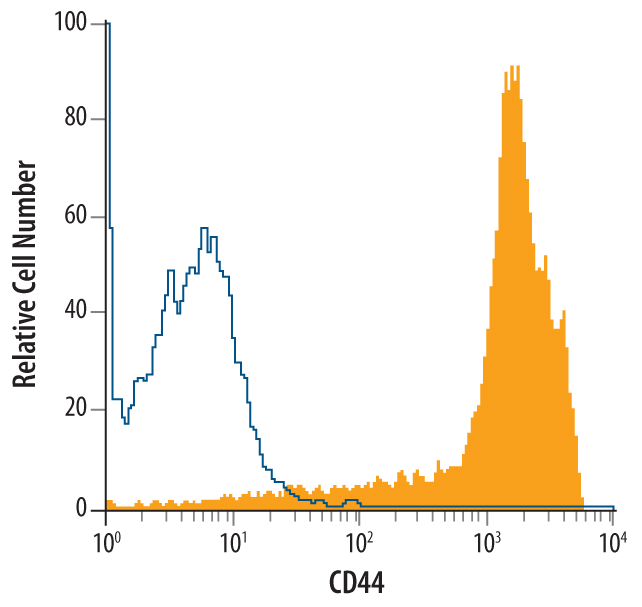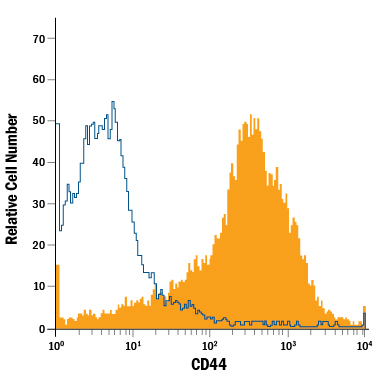Canine/Equine CD44 Antibody Summary
Accession # Q28284
Applications
Please Note: Optimal dilutions should be determined by each laboratory for each application. General Protocols are available in the Technical Information section on our website.
Scientific Data
 View Larger
View Larger
Detection of CD44 in Canine Monocytes by Flow Cytometry. Canine blood-derived monocytes were stained with Mouse Anti-Canine/Equine CD44 Monoclonal Antibody (Catalog # MAB5449, filled histogram) or isotype control antibody (Catalog # MAB002, open histogram), followed by Allophycocyanin-conjugated Anti-Mouse IgG F(ab')2Secondary Antibody (Catalog # F0101B).
 View Larger
View Larger
Detection of CD44 in Equine PBMCs by Flow Cytometry. Equine peripheral blood mononuclear cells (PBMCs) were stained with Mouse Anti-Canine/Equine CD44 Monoclonal Antibody (Catalog # MAB5449, filled histogram) or isotype control antibody (Catalog # MAB002, open histogram), followed by Phycoerythrin-conjugated Anti-Mouse IgG Secondary Antibody (Catalog # F0102B).
Reconstitution Calculator
Preparation and Storage
- 12 months from date of receipt, -20 to -70 °C as supplied.
- 1 month, 2 to 8 °C under sterile conditions after reconstitution.
- 6 months, -20 to -70 °C under sterile conditions after reconstitution.
Background: CD44
Canine CD44 is a ubiquitously expressed 85‑90 kDa transmembrane glycoprotein that binds to hyaluronan and is involved in matrix adhesion, lymphocyte activation, and lymph node homing. The CD44 protein is expressed as a family of molecular isoforms generated by alternate splicing and variable posttranslational modification. Within the N‑terminal invariant portion of the ECD (aa 14‑191), canine CD44 shares 90%, 83%, and 82% identity with human, mouse, and rat CD44, respectively.
Product Datasheets
Citations for Canine/Equine CD44 Antibody
R&D Systems personnel manually curate a database that contains references using R&D Systems products. The data collected includes not only links to publications in PubMed, but also provides information about sample types, species, and experimental conditions.
8
Citations: Showing 1 - 8
Filter your results:
Filter by:
-
Cladophora glomerata methanolic extract promotes chondrogenic gene expression and cartilage phenotype differentiation in equine adipose-derived mesenchymal stromal stem cells affected by metabolic syndrome
Authors: L Bourebaba, I Michalak, M Baouche, K Kucharczyk, K Marycz
Stem Cell Res Ther, 2019-12-17;10(1):392.
Species: Equine
Sample Types: Whole Cells
Applications: Flow Cytometry -
5-Azacytidine and Resveratrol Enhance Chondrogenic Differentiation of Metabolic Syndrome-Derived Mesenchymal Stem Cells by Modulating Autophagy
Authors: K Marycz, JMI Houston, C Weiss, M Röcken, K Kornicka
Oxid Med Cell Longev, 2019-05-12;2019(0):1523140.
Species: Equine
Sample Types: Whole Cells
Applications: Flow Cytometry -
5-Azacytydine and resveratrol reverse senescence and ageing of adipose stem cells via modulation of mitochondrial dynamics and autophagy
Authors: K Kornicka, J Sz?apka-Ko, A ?mieszek, K Marycz
J. Cell. Mol. Med., 2018-10-28;23(1):237-259.
Species: Equine
Sample Types: Whole Cells
Applications: Flow Cytometry -
Combination of resveratrol and 5-azacytydine improves osteogenesis of metabolic syndrome mesenchymal stem cells
Authors: K Marycz, K Kornicka, JM Irwin-Hous, C Weiss
J. Cell. Mol. Med., 2018-07-12;0(0):.
Species: Equine
Sample Types: Whole Cells
Applications: Flow Cytometry -
Evaluation of Oxidative Stress and Mitophagy during Adipogenic Differentiation of Adipose-Derived Stem Cells Isolated from Equine Metabolic Syndrome (EMS) Horses
Authors: K Marycz, C Weiss, A ?mieszek, K Kornicka
Stem Cells Int, 2018-06-06;2018(0):5340756.
Species: Equine
Sample Types: Whole Cells
Applications: Flow Cytometry -
Macroautophagy and Selective Mitophagy Ameliorate Chondrogenic Differentiation Potential in Adipose Stem Cells of Equine Metabolic Syndrome: New Findings in the Field of Progenitor Cells Differentiation
Authors: K Marycz, K Kornicka, J Grzesiak, A ?mieszek, J Sz?apka
Oxid Med Cell Longev, 2016-12-08;2016(0):3718468.
Applications: Flow Cytometry -
Equine metabolic syndrome impairs adipose stem cells osteogenic differentiation by predominance of autophagy over selective mitophagy
J Cell Mol Med, 2016-09-14;0(0):.
Species: Equine
Sample Types: Whole Cells
Applications: Flow Cytometry -
Canine and Equine Mesenchymal Stem Cells Grown in Serum Free Media Have Altered Immunophenotype.
Authors: Clark K, Kol A, Shahbenderian S, Granick J, Walker N, Borjesson D
Stem Cell Rev, 2016-04-01;12(2):245-56.
Species: Canine
Sample Types: Whole Cells
Applications: Flow Cytometry
FAQs
No product specific FAQs exist for this product, however you may
View all Antibody FAQsReviews for Canine/Equine CD44 Antibody
There are currently no reviews for this product. Be the first to review Canine/Equine CD44 Antibody and earn rewards!
Have you used Canine/Equine CD44 Antibody?
Submit a review and receive an Amazon gift card.
$25/€18/£15/$25CAN/¥75 Yuan/¥2500 Yen for a review with an image
$10/€7/£6/$10 CAD/¥70 Yuan/¥1110 Yen for a review without an image







